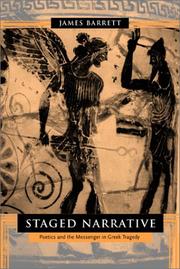| Listing 1 - 1 of 1 |
Sort by
|

ISBN: 0520231805 0520927931 9786612356582 1282356585 159734916X 9780520927933 0585419647 9780585419640 9780520231801 9781597349161 6612356588 9781282356580 Year: 2002 Publisher: Berkeley University of California Press
Abstract | Keywords | Export | Availability | Bookmark
 Loading...
Loading...Choose an application
- Reference Manager
- EndNote
- RefWorks (Direct export to RefWorks)
The messenger who reports important action that has occurred offstage is a familiar inhabitant of Greek tragedy. A messenger informs us about the death of Jocasta and the blinding of Oedipus, the madness of Heracles, the slaughter of Aigisthos, and the death of Hippolytus, among other important events. Despite its prevalence, this conventional figure remains only little understood. Combining several critical approaches-narrative theory, genre study, and rhetorical analysis-this lucid study develops a synthetic view of the messenger of Greek tragedy, showing how this role illuminates some of the genre's most persistent concerns, especially those relating to language, knowledge, and the workings of tragic theater itself. James Barrett gives close readings of several plays including Aeschylus's Persians, Sophocles' Electra and Oedipus Tyrannus, and Euripides' Bacchae and Rhesos. He traces the literary ancestry of the tragic messenger, showing that the messenger's narrative constitutes an unexplored site of engagement with Homeric epic, and that the role illuminates fifth-century b.c. experimentation with modes of speech. Breaking new ground in the study of Athenian tragedy, Barrett deepens our understanding of many central texts and of a form of theater that highlights the fragility and limits of human knowledge, a theme explored by its use of the messenger.
Greek drama (Tragedy) --- Messengers in literature. --- Narration (Rhetoric) --- Rhetoric, Ancient. --- History and criticism. --- History --- -Messengers in literature --- Rhetoric, Ancient --- Classical languages --- Greek language --- Greek rhetoric --- Latin language --- Latin rhetoric --- Narrative (Rhetoric) --- Narrative writing --- Rhetoric --- Discourse analysis, Narrative --- Narratees (Rhetoric) --- History and criticism --- Tragédie grecque --- Messagers dans la littérature --- Narration --- Rhétorique ancienne --- Histoire et critique --- Ancient rhetoric --- Messengers in literature --- achilles. --- aeschylus. --- ancient greece. --- ancient world. --- arete. --- athenian tragedy. --- bacchae. --- classicism. --- drama. --- electra. --- epic. --- epistemology. --- euripides. --- genre study. --- gods and goddesses. --- greek tragedy. --- hellenism. --- homer. --- homeric epic. --- hubris. --- human knowledge. --- literary ancestry. --- literary criticism. --- literature. --- messenger. --- mythology. --- narrative poetics. --- narrative theory. --- nonfiction. --- oedipus rex. --- oedipus tyrannus. --- oedipus. --- performing arts. --- persians. --- poetry. --- rhesos. --- rhetoric. --- rhetorical analysis. --- sophocles. --- theater. --- tragedy. --- tragic messenger.
| Listing 1 - 1 of 1 |
Sort by
|

 Search
Search Feedback
Feedback About UniCat
About UniCat  Help
Help News
News